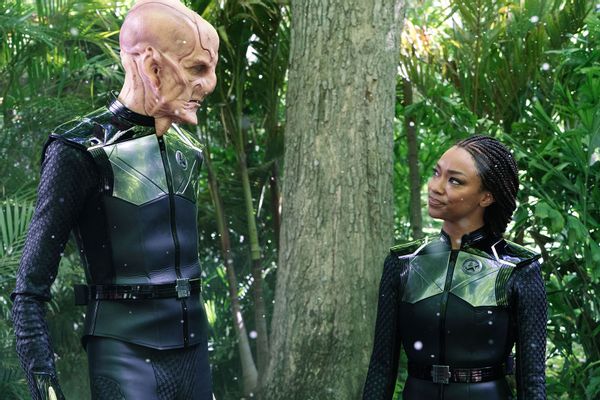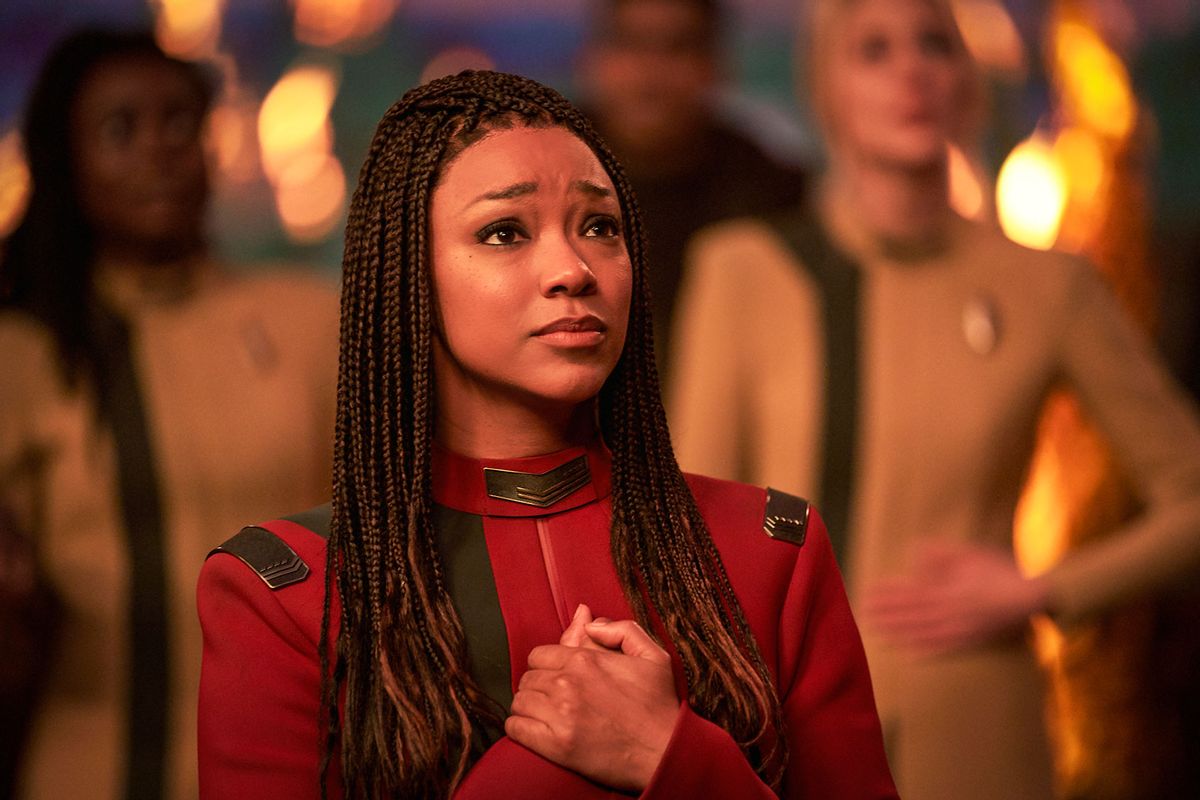Michael Burnham's "Star Trek" journey was destined to be among the franchise's toughest and most complex. Some of us knew this from the moment Sonequa Martin-Green was cast to play her, especially Black women who are sci-fi geeks. We have never been few, but until recently, we were far less visible than we are now.
To some, this visibility symbolizes everything that has supposedly gone wrong with this franchise and others. The reach of "Star Trek: Discovery" goes even further by assembling a truly inclusive cast that blew apart the original series' longstanding heteronormativity.
All this further angered culture war trolls and self-appointed arbiters of what is so-called "real" "Star Trek." These people have a vested interest in downvoting any such divergences from what has gone before.
Mainly it was — as it continues to be — the purists who wrote off "Discovery" as "not Trek" during its first season in 2017. Looking back from its final season — and from the perspective of Burnham's 900-year journey — we can say that despite how its thematic shading looked to us then, "Discovery" never abandoned Gene Roddenberry's optimism. It has simply evolved its interpretation.
In the first season, not even Burnham would believe this to hold true. A human raised on Vulcan by Spock's father, Sarek, and as his sister, Burnham earns her first officer role through superior conduct and logic, divorcing herself from sentiment.
Burnham's smug sense of rectitude gets her superior officer killed. She is charged with mutiny, stripped of her rank and sentenced to life in prison.
 Sonequa Martin-Green as Burnham and Callum Keith Rennie as Rayner in "Star Trek: Discovery" (Marni Grossman/Paramount+)But her record provides her with a second chance aboard the U.S.S. Discovery as a specialist who eventually proves herself to be resourceful and reliable enough to gain a pardon, reinstatement and medal of honor.
Sonequa Martin-Green as Burnham and Callum Keith Rennie as Rayner in "Star Trek: Discovery" (Marni Grossman/Paramount+)But her record provides her with a second chance aboard the U.S.S. Discovery as a specialist who eventually proves herself to be resourceful and reliable enough to gain a pardon, reinstatement and medal of honor.
From there, she stops a rogue galactic A.I. from annihilating the Federation and leaps nine centuries into the future (thereby largely freeing herself and the show from restrictive canon) to find a universe where Starfleet as it used to be is a dream, and the Federation and its ideals are broken.
"Discovery's" swansong season finds Burnham in the year 3191, with enough of the Federation's trust to take on a highly classified mission alongside Captain Rayner (Callum Keith Rennie), who has already earned the same commendations as Kirk and Picard. His reputation precedes him, in other words. Their quest relates to a Picard-era discovery that Starfleet fears can be used to eradicate all humanoid life in the universe.
"Discovery" never abandoned Gene Roddenberry's optimism. It has simply evolved its interpretation.
Their success should place her on par with the greats, an honor that showrunner Michelle Paradise and the show's co-creator Alex Kurtzman have been driving toward all this time.
Some indicators of that goal aren't as obvious as others, like the sequence in which Rayner defies Burnham during an away mission, trusting in his overconfidence instead of her strategic acumen. His snap judgment endangers a planet's civilian population, leaving her to fix the crisis he has created.
Women watching this — especially Black women, I would wager — might have experienced a slight rage triggering in their soul that was mollified by Burnham pulling the very Obama-esque move of asking Rayner to replace her trusted friend Saru (Doug Jones) as her first officer. (The job was coming open, anyway; Saru is shifting into diplomacy mode and getting married.)
This is the move of a great leader. Then again, like Kate Mulgrew's long underappreciated Captain Janeway, it may not be appreciated by the fandom for many, many years.
Burnham's arc contradicts what we know about the great Starfleet captains profiled in this franchise, most of whom are white and male.
Burnham's arc contradicts what we know about the great Starfleet captains profiled in this franchise, most of whom are white and male, though if that were the extent of what differentiates her from the rest, it would barely be worth mentioning.
Records of their histories come to us as snippets of dialogue from secondary characters or contextualizing conversations from what the official logs have to say about past missions. We hear about who served under whom, granting legitimacy to the likes of, say, Christopher Pike to claim the captain's chair long before Anson Mount made us ecstatic to see that happen.
Burnham's path to the helm's command begins with what should be a life- and career-ending mistake. It's constantly defined by humility and doubt. No one is harder on Burnham than she is on herself — and nobody takes as many risks with their career or reputation to keep their crew alive. Her optimism is one guided by the hope that all obstacles can be overcome and all outcomes are possible, including for herself.
Despite all of this, it will take a lot of convincing for some people to consider Burnham among the top ranks of Starfleet captains in those occasional fan polls that tend to place Jean-Luc Picard or James T. Kirk in the top positions, though Captain Pike has offered stiff competition since "Strange New Worlds" first aired.
 Doug Jones as Saru and Sonequa Martin-Green as Burnham in "Star Trek: Discovery" (Michael Gibson/Paramount+)A predictable response, since "Strange New Worlds" aligns with the old-school "Star Trek" tone.
Doug Jones as Saru and Sonequa Martin-Green as Burnham in "Star Trek: Discovery" (Michael Gibson/Paramount+)A predictable response, since "Strange New Worlds" aligns with the old-school "Star Trek" tone.
But our relatively newfound love of Pike and that show wouldn't be possible without "Discovery" venturing into the unmapped asteroid field that is the public's willingness to boldly go back to a dormant franchise in a wildly disunified era.
This doesn't merely refer to the role of "Discovery" introducing Mount's Pike, in addition to launching every other new "Trek" spinoff along with the streaming service currently known as Paramount+. It did all this along with shouldering the more precarious mission of serving as the franchise's vanguard in a cynical age.
If you love "Lower Decks" and "Strange New Worlds," this is in part due to the producers' listening to the fandom's programming desires accordingly. Notice, for example, how unlike the first season of "Picard" is from the third. Initially, "Picard" tried to do something different with the beloved character. It ended his adventures by reassembling the band for the spectacular last ride their films denied them. The new "Star Trek" series have a goal of delivering something for everyone, including kids. "Discovery" helped its custodians figure that out.
We need your help to stay independent
And if you love "Discovery," its devotion to showcasing those who long felt unseen in this franchise may kindle that affection. "Discovery" gave us an Asian woman as a Starship captain in Michelle Yeoh's Philippa Georgiou and a happily married duo to root for in Wilson Cruz's Dr. Hugh Culber in Anthony Rapp's Paul Stamets.
It introduced Tig Notaro in its second season as Jett Reno, a decision for which everyone should be grateful. The third gave us the franchise's first transgender and non-binary characters in Ian Alexander's Trill Gray and Blu del Barrio's Adira Tal.
Through it all, we have also entirely fallen for Mary Wiseman's Sylvia Tilly, a woman who also knew a few things about self-doubt and, therefore, values being understood.
What some would cite as humanizing traits, others might write off as maudlin, along with the fact that Burnham was able to experience a fully realized love affair that began with a partnership of equals with a courier named Booker (David Ajala).
Want a daily wrap-up of all the news and commentary Salon has to offer? Subscribe to our morning newsletter, Crash Course.
It's only one of the many ways that "Discovery" is consciously disparate from "Star Trek" as we have long known it, daring to change everything from the look of the Klingons to its star character's role in igniting a war between them and the United Federation of Planets.
That was then. Hundreds of years after that moment, Captain Burnham has figured herself out, proving to the many who doubted her that she deserves to be there.
She has traveled the longest road through imposter syndrome of any Starfleet captain — most of a millennium, actually — and we have witnessed every major moment that forged her. Burnham may never win the major "Star Trek" popularity contests for favorite captains, but without a doubt, she's the last great one we may ride with in this universe.
New episodes of "Star Trek: Discovery" stream Thursdays on Paramount +.
Read more
stories about "Star Trek"



Shares